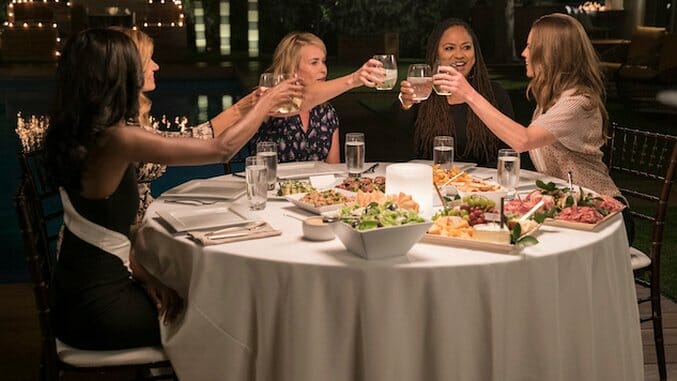Can Chelsea Handler’s Dinner Parties Revive the Art of Conversation?
Greg Gayne/Netflix
In a 2012 New York Times article about dinner parties and their impending death knell, Judith Martin, Miss Manners herself, cautioned that “conversation is in trouble”: “People have been brought up to express themselves rather than to exchange ideas.” We need not look further than those television shows that ostensibly offer us conversations with celebrities and public figures on a nightly basis. Indeed, with its increasingly canned and PR-approved soundbite-ridden banter—often just another attempt by producers and social media interns to turn out viral-ready moments—the late-night interview has all but lost any excitement it once mustered. Currently, there’s little trace of the electric (and sometimes contentious) exchange of ideas that first made programs like The Dick Cavett Show, Johnny Carson’s The Tonight Show, or David Letterman’s The Late Show must-see late-night TV. Instead we’ve been saddled with Jimmy Fallon’s frat-bro shenanigans and James Corden’s carpool karaoke segments. Even looking at the two most thrilling names in late night right now (Full Frontal’s Samantha Bee and Last Week Tonight’s John Oliver), you see a model of talking-to that encourages conversation beyond the screen but not within it. Enter: Chelsea Handler.
Ahead of the May debut of her latest Netflix show, Chelsea, the former E! Entertainment host insisted that she was seeking to upend the late-night template. Her first few episodes suggested she hadn’t been too successful: In The Atlantic, David Sims argued that “the series makes a noble effort, but from the look of its first episodes, it hasn’t yet figured out a way to stand out from its competitors.” A few months’ worth of shows later, though, indicate that Handler has found at least one way to stand out: her dinner parties.
First tested out in her four Netflix specials, Chelsea Does, Handler’s dinner party episodes bring together an eclectic group of people for a conversation on a topic the hostess (the word all the more telling in this new context) is eager to learn more about. From her very first episode (“Appetite for Instruction”), learning and listening have been at the forefront of Chelsea. But her dinner parties, which have featured conversations about parenting (with, among others, Kate Hudson and Randall Park), politics (with W. Kamau Bell and S.E. Cupp) and relationships (with Sarah Jessica Parker and Trevor Noah), stand out precisely because they allow the at-times painfully tone-deaf comedian to take a back seat and let her guests converse with one another, leading to some of the most candid unscripted moments in contemporary television.
It’s the closest the current television landscape has to lively, productive conversation, even as Handler would bristle at the suggestion these segments tap into a decidedly feminine (if not outright feminist) tradition. After all, despite appearing in a “late-night show” (though, given Netflix’s model, such a moniker is almost immaterial), the format seems borrowed from daytime. Shows like The View and The Talk are premised on the value of bringing women with opposing views together, the better to suss out the day’s “hot topics” or dissect the latest news.
Chelsea opts for less timely interactions, aiming instead for broader lifestyle concepts. Take the October 19 episode “These Strong Women,” when her guest list included Academy Award-winner Hilary Swank, Selma director Ava DuVernay, reigning Miss USA Deshauna Barber, and Nashville’s Connie Britton. Their conversation, which tackled aging, dating and sexism, doubled as a mentoring session in real time with the seasoned stars offering advice to the young Miss USA—who awed them all with her military experience and swiftly shut Handler down when she tried to make the argument that women are, you know, biologically weaker than men. The crosstalk in moments like these (as when DuVernay and Handler clashed over their conflicting stances on affirmative action) is refreshing for its candor. Barber even found herself wondering how her newfound role gave her a platform that she nevertheless felt needed to be carefully handled: “Can I say Black Lives Matter on my Instagram as a Miss USA, as a soldier?” The question itself pointed to the types of conversations that many are quick to avoid.
-

-

-

-

-

-

-

-

-

-

-

-

-

-

-

-

-

-

-

-

-

-

-

-

-

-

-

-

-

-

-

-

-

-

-

-

-

-

-

-








































